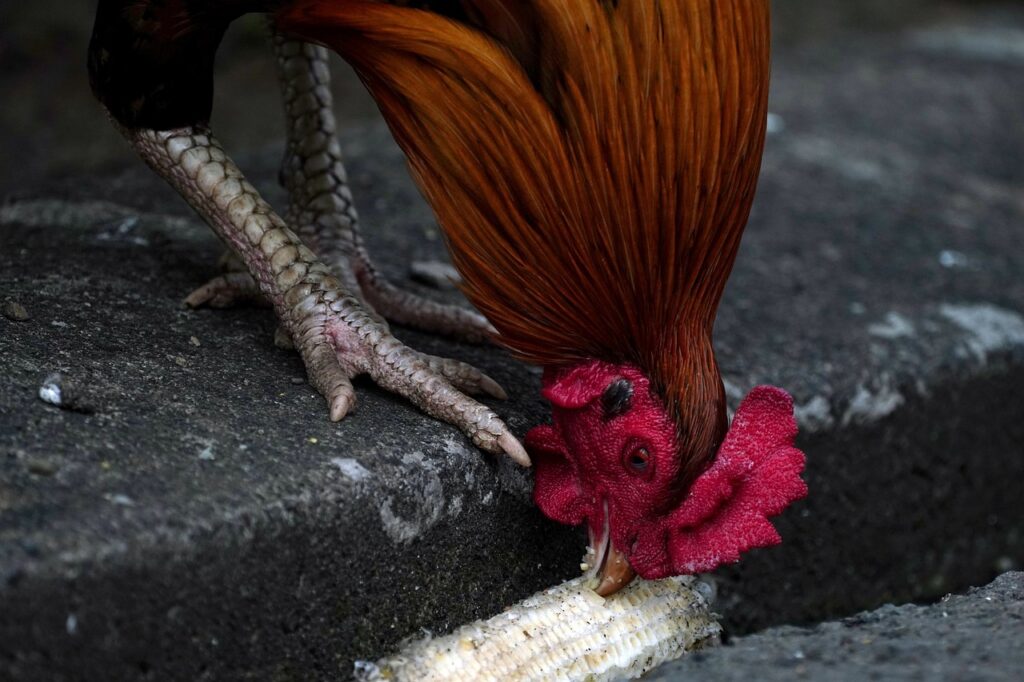In the quest for healthier, happier backyard chickens, many poultry enthusiasts overlook a simple and sustainable solution right in their own kitchens: supplementing their flock’s diet with kitchen scraps. Not only does this practice enhance chicken health, but it also provides an effective means of reducing household waste. Let’s explore the benefits and best practices of incorporating kitchen scraps into your feathered friends’ diet.
Table of Contents
Maximizing Nutrition:
Kitchen scraps can offer a diverse array of nutrients that complement commercial chicken feed, contributing to a more balanced diet for your flock. Fruits, vegetables, grains, and even certain protein sources can provide vitamins, minerals, and essential nutrients crucial for chicken health and egg production, however it’s important to not overdo any single item when supplementing your chicken’s feed. In her best-selling handbook “Storey’s Guide to Raising Chickens“, author Gail Damerow says that to to so, “can cause slow growth, reduce laying, and poor health.” So when looking to use up your kitchen scraps, consider the following:
Fruits and Vegetables: Leftover fruits and vegetables, such as apples, carrots, leafy greens, and squash, are excellent sources of vitamins A, C, and K, as well as fiber. These nutrients support overall health and help maintain strong immune systems in chickens.
Grains and Bread: Uncooked grains like rice, oats, and barley, as well as stale bread, can serve as valuable sources of carbohydrates and energy. However, avoid feeding moldy or excessively processed grains, as they may be harmful to chickens.
Protein Sources: While chickens are primarily herbivores, they can benefit from occasional protein-rich treats like cooked eggs, yogurt, and mealworms. These foods provide essential amino acids necessary for muscle development and feather growth.
Reducing Food Waste:
In addition to improving chicken health, supplementing their diet with kitchen scraps offers an eco-friendly solution to reduce household food waste. According to the Environmental Protection Agency, food scraps account for a significant portion of municipal solid waste in the United States, contributing to environmental degradation and greenhouse gas emissions. By repurposing kitchen scraps as chicken feed, backyard poultry keepers can divert organic waste from landfills while simultaneously nourishing their flocks.
Best Practices for Feeding Kitchen Scraps to Chickens:
While feeding kitchen scraps to chickens can be beneficial, it’s essential to follow these guidelines to ensure their safety and well-being:
Avoid Spoiled or Moldy Food: Only feed fresh, non-spoiled kitchen scraps to your chickens. Moldy or spoiled food can make chickens sick and should be discarded.
Limit Processed Foods: While occasional treats like bread are acceptable, avoid feeding chickens highly processed or sugary foods, as they can lead to health problems like obesity and digestive issues.
Moderation is Key: Kitchen scraps should supplement, not replace, a balanced commercial chicken feed. Aim to provide scraps as treats in moderation, ensuring that they comprise no more than 10-15% of your chickens’ overall diet.
Chop or Shred Larger Items: To prevent choking hazards and promote easier digestion, chop or shred larger kitchen scraps into smaller, bite-sized pieces before offering them to your flock.
Monitor for Allergic Reactions: Introduce new kitchen scraps gradually and observe your chickens for any signs of allergic reactions or digestive upset. Remove any foods that cause adverse effects.
Conclusion:
Supplementing your backyard chickens’ diet with kitchen scraps is a simple yet effective way to enhance their health and well-being while reducing household waste. By providing a diverse array of nutrient-rich foods, you can support your flock’s nutritional needs and promote sustainable practices on your homestead. With proper care and moderation, feeding kitchen scraps to chickens can be a rewarding aspect of backyard poultry keeping, benefiting both your feathered friends and the environment.


